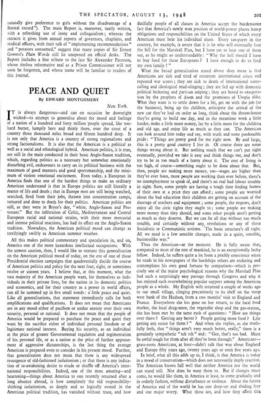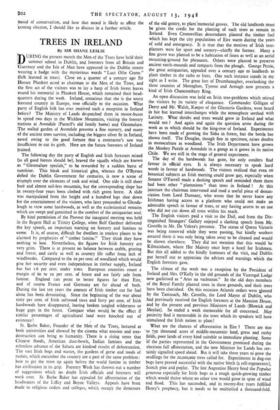PEACE AND QUIET
By EDWARD MONTGOMERY New York.
IT is always dangerous—and can on occasion be downright wicked—to attempt to generalise about the mood and feelings of a nation of a hundred and forty million 'people spread, like too- hard butter, lumpily here and thinly there, over the crust of a country three thousand miles broad and fifteen hundred deep. It is not only that America is a country of strong regionalisms and strong factionalisms. It is also that the American is a political as well as a social and ethnological hybrid. American politics, it is true, are still in the main conducted in their basic Anglo-Saxon tradition, which, regarding politics as a necessary but somewhat emotionally disturbing evil, endeavours to carry on its political business with the maximum of good manners and good sportsmanship, and the mini- mum of violent emotional excitement. Even today, a European in America finds that one of the hardest things to make an ordinary American understand is that in Europe politics are still literally a matter of life and death ; that in Europe men are still being watched, searched, fired from their jobs, thrown into concentration camps, tortured and done to death for their politics. American politics are still, as they were in Bryce's day, "white, Anglo-Saxon and Pro- testant." But the infiltration of Celtic, Mediterranean and Central European racial and national strains, with their more mercurial and intense political reactions, has had its effect on the Anglo-Saxon tradition. Nowadays, the American political mood can change as terrifyingly swiftly as American summer weather.
All this makes political commentary and speculation in, and on, America one of the more hazardous intellectual occupations. With the utmost caution, then, I would like to venture this generalisation on the American political mood of today, on the eve of one of those Presidential election campaigns that quadrennially decide the course of American politics and policy for the next four, eight, or sometimes twelve or sixteen years. I believe that, at this moment, what the vast majority of the American people want, for themselves as indi- viduals in their private lives, for the nation in its domestic politics and economics, and for their country as a power in world affairs, can all be summed up in five small words : al little peace and quiet. Like all generalisations, that statement immediately calls for both amplifications and qualifications. It does not mean that Americans are in any mood either of pacifism or undue anxiety over their own security, personal or national. It does not mean that the people of America would be prepared to purchase the peace and quiet they want by the sacrifice either of individual personal freedom or of legitimate national interest. Buying his security, as an individual at the price of greater Governmental regulation and regimentation of his personal life, or as a nation at the price of further appease- ment of aggressive dictatorships, is the last thing the average American is prepared even to consider in his present mood. Further, that generalisation does not mean that there is any widespread resurgence of old-fashioned isolationism ; or that there is any indica- tion of re-awakening desire to evade or shuffle off America's inter- national responsibilities. Indeed, one of the most amazing—and heartening—things about America to one recently returned after a long absence abroad, is how completely 'the old responsibility- shirking isolationism, so deeply and so logically rooted in the American political tradition, has vanished without trace, and how
dutifully people of all classes in America accept the burdensome fact that America's newly won position of world-power places heavy obligations and responsibilities on the United States of which every American must bear his individual share. Every tax-payer in the country, for example, is aware that it is he who will eventually foot the bill for the Marshall Plan, but I have yet to hear one of them say, as he might so understandably : "Why the hell should I have to buy food for these Europeans ? I have enough to do to feed my own family ! "
What the broad generalisation stated above does mean is that Americans are sick and tired of recurrent international crises and repeated war scares ; they are sick to death of international name- calling and ideological mud-slinging ; they are fed up with domestic political bickering and partisan sniping ; they are bored to exaspera- tion by the prophets of doom and the promisers of Utopia alike. What they want is to settle down for a bit, get on with the job (or the business), bring up the children, anticipate the arrival of the new car they've had on order so long, think about the dream-house they're going to build one day, and in the meantime work a little harder, make a little more money, lay by a little more for the children and old age, and enjoy life as much as they can. The American can look around him today and say, with truth and some pardonable pride: "Things are pretty good for me right now. By and large, this is a pretty good country I live in. Of course there are some things wrong about it. But nothing much that we can't put right eventually, provided we take it easy and think things out, and don't try to be in too much of a hurry about it. The cost of living is too high, of course—something ought to be done about that. But, then, people are making more money, too—wages are higher than they've ever been, more people are working than ever before, there's no unemployment to speak of, and there's no real bad labour trouble in sight. Sure, some people are having a tough time finding homes of their own at a price they can afford ; some people are worried about the bad education their children are getting on account of the shortage of teachers and equipment ; some people, the negroes, don't enjoy all the civic rights they ought to ; some people are making more money than they should, and some other people aren't getting as much as they deserve. But we can fix all that without too much trouble, and certainly without any, revolutions or any of these Socialistic or Communistic notions. The basic structure's all right. All we need is a few sensible changes, made in a quiet, sensible, businesslike way."
Thus the American—at the moment. He is fully aware that, compared to most of the rest of mankind, he is an exceptionally lucky fellow. Indeed, he suffers quite a lot from a prickly conscience when he reads in his newspapers of the hardships others are enduring and contemplates his own good fortune by comparison—which is pre- cisely one of the major psychological reasons why the Marshall Plan had such a surprisingly easy passage through Congress and why it has enjoyed such overwhelming popular support among the American people as a whole. My English wife returned a couple of weeks ago to our small village, clinging precariously to its shelf on the steep west bank of the Hudson, from a two months' visit to England and France. Everywhere she has gone on her return, to the local food market, the local drug-store, the vegetable shop and the gas-station, she has been met by the same rush of questions : "How are things over there ? Getting any better ? People getting more food ? Life getting any easier for them ? " And when she replies, as she truth- fully feels, that "things aren't very much better, really," there is a genuinely sympathetic " tch tch " and: "Gee, that's too bad. Must be awful tough for them after all they've been through." Americans- grass-roots Americans, at least—didn't talk that way about England and Europe fifty years ago, twenty years ago or even five years ago.
In brief, what all this adds up to, I think, is that America is today in a mood of conservatism—which does not necessarily imply reaction. The American knows full well that neither America nor the world can stand still. Nor does he want them to. But if changes must come, he would like them, in America at least, to come gradually and in orderly fashion, without disturbance or violence. About the future, of America and of the world he has one deep-set and abiding fear and one major worry. What these are, and how they affect thi4 'mood of conservatism, and how that mood is likely to affect the coming election, I should like to discuss in a further article.



































 Previous page
Previous page